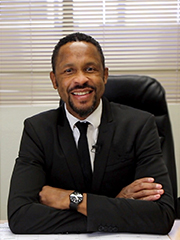Professor Shingai Mutambirwa, Head of the Department of Urology at Sefako Makgatho Health Sciences University (SMU) says it’s time to man up when it comes to men’s health. “The fact that us males see our physicians five times fewer in our lives than females do is definitely one of the reasons why we are more likely to die from cancer.”
World Cancer Day
On World Cancer Day 4th February 2022 he has firm words on why the number of men being diagnosed with late-stage cancer is on the increase.
“Basically, guys don’t take their health as seriously as females do. And given that the two leading causes of death worldwide are cardiovascular disease, including heart attacks and strokes, and cancer, this is something that needs to be addressed”.
Men’s Health and Cancer
Andrew Oberholzer is the CEO of the Prostate Cancer Foundation (PCF). He says that the unfortunate reality of men not prioritizing their health is something that his organization is trying hard to address.

Photo by Anastase Maragos on Unsplash
“For many men, there is just a sense of apathy when it comes to health issues. They tend to wait until things start going wrong before they seek help,” he says.
“This is a big problem, as many diseases such as high blood pressure and prostate cancer have no symptoms in the early stages. By the time that there are symptoms from prostate cancer, the disease may have progressed to a stage where it is no longer curable,” he says.
Cancer gender gap
Women and men have similar survival outcomes until about the age of 60, after which men’s outcomes start deteriorating. According to Prof Mutambirwa, this can, in part, be attributed to the fact that men are just more reluctant to have health check-ups.
He says the “tough guy” mentality, combined with the behavior of only getting something checked once there is a lump, bump or pain, needs to change.
Men don’t visit the doctor
Gerda Strauss is Head of Services at the Cancer Association of South Africa (CANSA). She echoes how South African men across the board tend to be hesitant when it comes to checks and screening. She also points out that the underlying reasons for this may differ culturally and socio-economically.
Strauss adds that their internal stats show that of those benefitting from CANSA’s screening and awareness events annually, 81% are women and 19% are men. “Early detection saves lives and ignorance definitely leads to late diagnosis,” she says.

Photo by nappy from Pexels
According to Professor Mutambirwa, who is also a founding member of PCF, men whose prostate cancer is detected early have a 95% chance of being cured and will have a similar life expectancy to someone without cancer.
Know your risks
Oberholzer explains that an additional challenge is that many men are simply not aware of the age and risk recommendations for prostate cancer screening. This is one of the Prostate Cancer Foundation’s key focus areas.
African men and men with a family history of prostate and/or breast cancer as a first-degree relative need to be screened annually from the age of 40. All men over the age of 45 need to be screened annually.
Get comfortable with discomfort
Men of all cultures also seem to have developed a serious fear of the digital rectal examination, commonly known as “the finger”.
“We still recommend it, together with a Prostate Specific Antigen (PSA) blood test, but if this is really a barrier to screening, then men should at least go for the PSA blood test every year,” Oberholzer says.
The incidence of testicular cancer has doubled in the last 50 years. The cancer primarily affects young men between the ages of 15-40 years. Once again, early detection and knowing the risks are key. Men from the age of 15 to 49 years need to examine their testicles each month. They should feel for any pea-sized lumps that could indicate testicular cancer. 
Fortunately, there seems to be a lot more awareness about testicular cancer than a decade ago. Oberholzer hopes this has led to more boys and men performing testicular self-examinations.
Women can play a part
Prof Mutambirwa says that women have a powerful role to play in raising awareness about testicular and prostate cancer.
“We need to continue targeting mothers and female partners to encourage their sons and male partners to talk about general health and sexual health.
We need women to talk to their men about getting checked for cardiovascular issues such as high blood pressure and cholesterol, as well as cancers such as prostate cancer, testicular cancer, and colorectal cancer which is also rising in men” Prof Murtambirwa says.
“If men cannot take care of their own health, women need to intervene to save lives,” he says.
 Gerda reiterates this and says that there needs to be an open relationship between boys and mothers when it comes to their bodies.
Gerda reiterates this and says that there needs to be an open relationship between boys and mothers when it comes to their bodies.
“Teenage boys need to be told accurate and factual information, and they need to be able to identify the warning signs of testicular cancer specifically,” she says.
Education is key
Oberholzer emphasizes the importance of parents educating themselves before they educate their children about health issues.
“Relying on information that is passed down from generation to generation is not always a good thing when it comes to health issues, as this information may not be scientifically accurate.
There is a plethora of information on the internet, but not all of it is scientifically accurate, so again, ensure that whatever information is passed on is from a credible source,” he says. ![healthy sex [longevity live]](https://longevitylive.com/wp-content/uploads/2019/03/adult-beard-cement-845434-320x213.jpg)
The need for education, combined with the fact that many men lack access to screening. This makes events such as the Hollard Daredevil Run and other cancer awareness initiatives so important. The annual event raises awareness about prostate and testicular cancer. All proceeds are given to CANSA and the Prostate Cancer Foundation to address some of these challenges.
Bottom line on men’s health
“Some men seem to think that seeing a healthcare professional means that they are weak. If anything, taking ownership of your health should be viewed as a sign of maturity,” says Oberholzer.
This World Cancer Day, schedule your annual PSA test and talk to your sons about regular testicular self-examinations. For more information, go to Prostate Cancer Foundation and CANSA. Follow Daredevil Run on Facebook to stay up to date with information about what’s in store this year.
About Professor Shingai Mutambirwa
 Prof Shingai is Head of Department of Urology, Sefako Makgatho Health Sciences University (SMU). He is a charismatic leader in the field of men’s health, striving for brilliance and uniting men in a brotherhood of caring for each other. Although born in Zimbabwe, Shingai grew up in Canada as his parents had relocated in order to pursue post graduate studies. He has retained a strong American accent, and his deep baritone voice is now instantly recognisable on radio in South Africa.
Prof Shingai is Head of Department of Urology, Sefako Makgatho Health Sciences University (SMU). He is a charismatic leader in the field of men’s health, striving for brilliance and uniting men in a brotherhood of caring for each other. Although born in Zimbabwe, Shingai grew up in Canada as his parents had relocated in order to pursue post graduate studies. He has retained a strong American accent, and his deep baritone voice is now instantly recognisable on radio in South Africa.
His passion for research and his desire to “make things happen”, has resulted in his involvement in a number of innovative projects. These include; being a founding member of the Prostate Cancer Foundation of South Africa (PCF) and heading a review board for “South African Guidelines for Enuresis” under the Enuresis Academy of South African.
In addition he is extensively involved in various leadership roles, these include;
being a peer reviewer for The Journal of Urology (AUA), African Journal of Urology and Hindawi online publications. Heading the medical and scientific advisory board of The Prostate Cancer Foundation of SA (PCF) and heading the academic committee for the South African Urological Association (SAUA) He is also a member of the Continence Association of South Africa (CASA)



![women [longevity live]](https://longevitylive.com/wp-content/uploads/2020/01/photo-of-women-walking-down-the-street-1116984-100x100.jpg)










